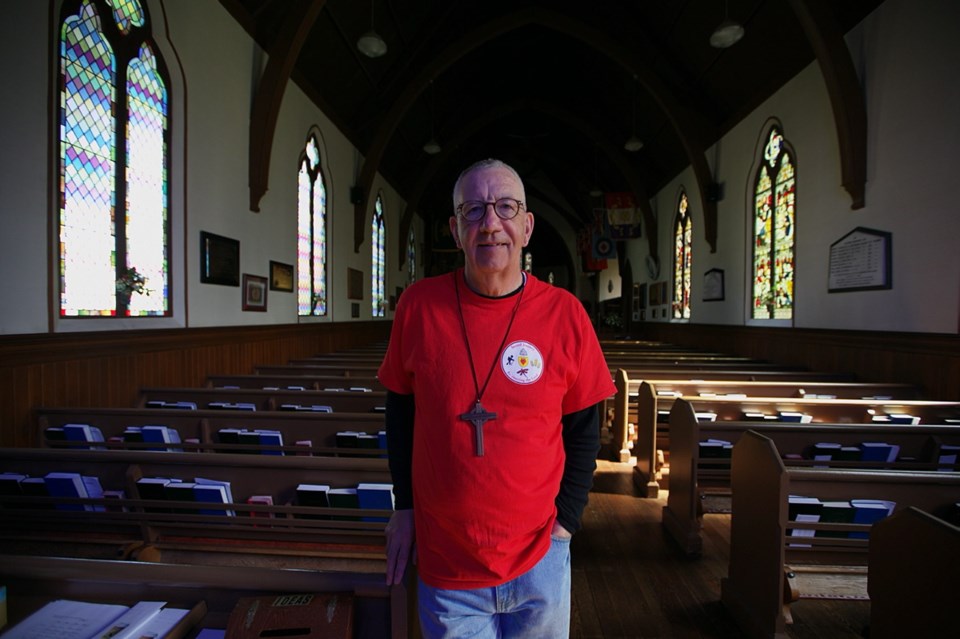Bishop Logan McMenamie has apologized.
As he walked from Alert Bay to Victoria on a sacred journey of repentance, McMenamie was taking the first steps to build a new and better relationship between First Nations and the Anglican church.
In each of the First Nation communities he visited, his message was the same.
“We failed you. We failed to recognize the Creator in you and your land, your culture and your tradition. We failed to recognize the gifts that you had here.
“We were part of a system in the residential schools that took your children from you and they suffered sexual, physical and cultural abuse. And I’m very, very sorry. We failed you, we failed ourselves, and we failed the Creator.”
McMenamie, 65, bishop for the area covering Vancouver Island, the Gulf Islands and Kingcome Inlet, will complete his 480-kilometre pilgrimage this morning, Easter Sunday, at Christ Church Cathedral. Before he steps into the pulpit, he’ll trade his hiking boots, red T-shirt and jeans for his crosier, robes and miter.
The congregation will be told about the journey McMenamie describes as transforming, with significant moments of healing and hope along the way.
“Real relationship-building has begun, new mutual respect has been established and there is a sense that we are on a journey together towards true reconciliation,” McMenamie said.
Before embarking on his pilgrimage, the bishop met with the chiefs and elders, asking for permission to pass through their lands.
“Many asked me what I was going to do after the walk. It was a journey of humility and repentance, but the challenge was always there. Are you going to be around later? Are you going to be with us?”
The answer is yes, said the bishop.
“We have the potential now for a far better relationship with the First peoples. There’s still a lot of work to be done. It’s only the first step. But the potential is here as we continue to commit ourselves to this relationship.”
The journey, which began March 6, was challenging. The bishop was accompanied by Wayne Stewart, who walked with him from Alert Bay, and Jim Holland, who made the journey from Campbell River. Some days, they walked 25 kilometres. Most days it was 30 kilometres. On two days, the walk was 40 kilometres. There were also events at churches along the way.
“We were quite tired emotionally, physically and spiritually,” McMenamie said.
But the journey, made in prayer, meditation and penitence, was also healing, he said.
“To be in creation. How do you explain when you’re out there walking and meditating, the sounds of an eagle, or the sounds of sea lions barking on the beach? The silence was so profound, it took us deeper into ourselves. Then for the first time, you hear the waves in Campbell River on the shore. That was really emotional.”
First Nations people opened their hearts and the church listened, McMenamie said. The church will look at the issues around revitalization of language and culture, the economic inequalities in First Nation communities and the 94 calls to action of the Truth and Reconciliation Commission.
“One of the things we said is: ‘We’re here to listen to you and learn from your culture, your language and your tradition. We didn’t do that when we first arrived as a colonial church and it’s time for us to do that now.’ ”
McMenamie is considering the possibility of making a cultural pilgrimage to Alert Bay with parishioners. Iona, off the west coast of Scotland, is also a possibility, he said.
McMenamie pointed out that Stewart and Holland have both done the Camino de Santiago, a network of pilgrimage routes coming together in Santiago de Compostela in Spain, and that prompted them to ask whether a Cowichan Camino might be possible.
“It’s not possible because of the cars,” he said with a laugh, “but we could have a pilgrimage on the Island. It was a transforming experience for us.”



